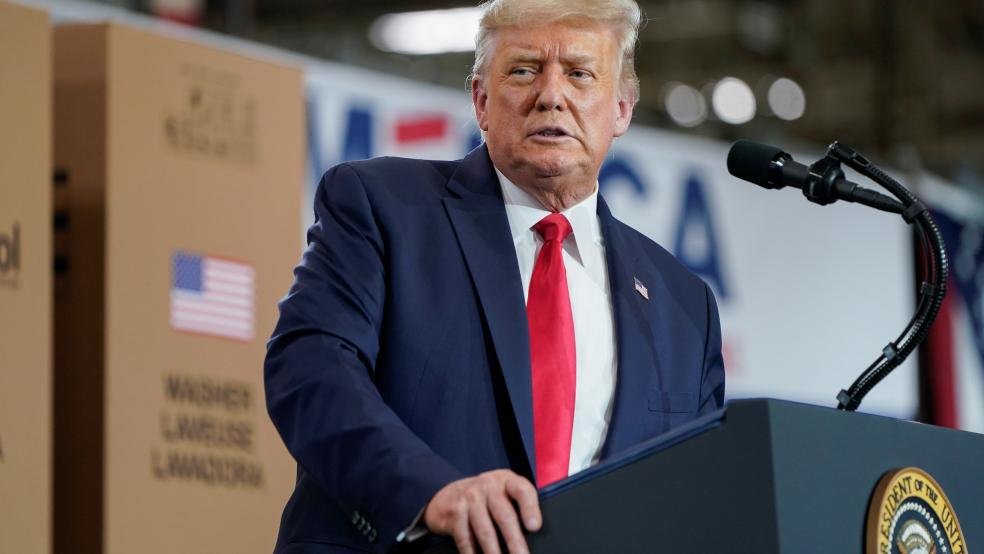That thud you heard today was the coronavirus relief talks collapsing, as negotiators said their latest meeting brought them no closer to a deal. “Unfortunately we did not make any progress,” Treasury Secretary Steven Mnuchin told reporters. Senate Minority Leader Chuck Schumer called Friday’s talks “disappointing.”
Trump administration officials said that in the absence of an agreement they would recommend that the president move forward with executive orders over the weekend to address the economic devastation caused by the pandemic.
What comes next: The talks are done, at least for now. “One side needs to completely change their position and neither side is interested. Some intervening event may change that — or it may not,” Politico’s Jake Sherman said Friday. Sherman added that lawmakers will likely “agitate” over the issue over the next few weeks, while noting that the debate over 2021 fiscal year funding starts up in September.
In the meantime, President Trump is expected to sign one or more executive orders addressing some of the issues that have been part of the negotiations, possibly including an eviction moratorium, student loan flexibility, a suspension of payroll taxes and unemployment aid — though the legality and effectiveness of addressing those issues though executive action is very much in question. “This is not a perfect answer — we’ll be the first ones to say that,” White House Chief of Staff Mark Meadows said. “But it is all that we can do and all the president can do within the confines of his executive power, and we’re going to encourage him to do it.”
Schumer and House Speaker Nancy Pelosi said that executive orders would be “unworkable, weak and narrow,” saying that they “barely scratch the surface of what is needed to defeat the virus and help struggling Americans.”
The key differences on a bigger deal: Fundamentally, the White House is still pushing for a “skinny” deal that Democrats dismiss as insufficient — Pelosi labeled it “anorexic” — to meet the needs of Americans in the face of the pandemic. Democrats are pushing for a much larger package, and while the two sides have made some progress on elements of a deal, they remain far apart on the overall size of response needed.
No meeting in the middle: At a press conference before their negotiating session, Pelosi and Schumer said that the White House had rejected an offer to meet in the middle on a roughly $2 trillion package. Pelosi said that Democrats had offered Thursday to cut $1 trillion from the cost of their $3.4 trillion offer if Republicans would agree to raise their $1 trillion offer by the same amount, leaving the two sides much closer to a deal in the range of $2 trillion to $2.4 trillion.
"Yesterday, I offered to them, ‘We'll take down a trillion, if you add a trillion in.’ They said absolutely not," Pelosi told reporters Friday. The cost reductions, she said, would be achieved by cutting the duration of some programs.
Asked about the possibility of raising their offer by $1 trillion, Mnuchin called the idea “a non-starter." He did not respond when asked why, but Meadows indicated that shortening the duration of some programs wouldn’t qualify as real cost reductions in his eyes. "I don't know that that's a reduction as much as she's just changing the time frames. So I don't think that she's come off of her number other than just making it shorter," he said.
Schumer laid much of the blame for the lack of progress on Meadows, the former North Carolina congressman and leader of the conservative House Freedom Caucus known more for blowing up deals than making them. “They’re the ones stuck. Basically what’s happening is Mr. Meadows is from the Tea Party, you have 20 Republicans in the Senate greatly influenced by them, and they don’t want to spend the necessary dollars to help get America out of this mess. Ideology sort of blinds them,” Schumer told reporters ahead of Friday’s talks.
After the unproductive meeting, Schumer told reporters that the White House negotiators had said they couldn’t go much above their existing $1 trillion offer. “We’re hopeful that they will think about it and come back and tell us they’re willing to meet us halfway,” he said.
Can they possibly still reach a deal? “I told them to come back when they’re ready to do a $2 trillion bill,” Pelosi told reporters after Friday’s meeting. CNN’s Phil Mattingly reports that some Senate Republicans — those that aren’t staunchly against another relief package altogether — have indicated that a $2 trillion price tag is a non-starter for them. Schumer, meanwhile told reporters that “Senate Democrats can't go south of $2 trillion” and that the Democratic-led House wouldn’t have the votes to pass anything less than $2 trillion. “Therein lies a pretty major problem,” Mattingly says.
Reading between the lines, that suggests there may be some wiggle room for a roughly $2 trillion deal, though Mattingly reports that Republicans have been “pretty clear the topline needs to have a ‘1’ in front of it.”
No additional talks are scheduled, but Mnuchin said Friday that if the two sides can agree on aid to state and local government, a deal could still be reached. Democrats want some $915 billion in additional money for state and local governments, while Republicans have offered about $150 billion. “The president is not going to do a deal that has a massive amount of money to bail out state and locals,” Mnuchin said.
Trump late Friday issued a misleading tweet claiming that Democratic leaders were only looking for money to bail out Democratic cities states — a tweet that suggests negotiations really are dead. “Pelosi and Schumer only interested in Bailout Money for poorly run Democrat cities and states. Nothing to do with China Virus! Want one trillion dollars. No interest. We are going a different way!”





